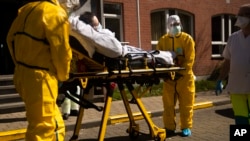As antimalarial drugs gain approval to treat certain coronavirus patients, experts are urging caution.
On Monday, the U.S. Food and Drug Administration gave short term authorization to use two drugs — hydroxychloroquine and chloroquine — to treat coronavirus in certain emergency cases. The drugs are being distributed to hospitals and are to be used for patients exhibiting acute respiratory problems.
President Donald Trump pushed for the authorization after a promising small-scale study in France showed hydroxychloroquine, in combination with an antibiotic, helped the recovery of coronavirus patients.
Dr. Jeff Colyer, a surgeon and the former governor of Kansas, has been an advocate for exploring the drug, saying it is one of the only medications available that has shown promise. Still, he said, it is not a cure-all and should be administered only by a physician.
“This is not something where you should go to the pharmacy and purchase it and use it yourself because you think you’re sick,” he told VOA this week. “It’s most important that you and your doctor make a decision on whether it’s appropriate for you. Right now, there are shortages of these medications worldwide. And so they really need to be reserved for the sickest patients.”
Colyer believes the urgency of the pandemic, which has infected over 850,000 people and killed more than 40,000 worldwide, demands quick action and unorthodox measures. He acknowledges the drug’s efficacy is far from proven.
“We need more data and more evidence in this. I’m the first person to say I’ve seen drugs that have looked promising and then they’ve turned out not to work so well,” he said. “This is the one that we have. So, as I say, you know, ‘You go to war with the army you have, not the one that you wish you had.’ But then you keep on building.”
Another study in China found no evidence hydroxychloroquine helped combat coronavirus. The drugs, which have been in use since the 1950s to treat malaria, also have rare but dangerous side effects.
Some experts have expressed unease at the speed of the approval. Dr. Cyrus Shahpar is a physician and director of the Prevent Epidemics team at Resolve to Save Lives, a global public health organization with operations in Africa.
He told VOA that even if the positive results from the small study can be replicated there is no information on how patients will do on a long-term basis.
“We don’t usually make recommendations based on trials of 40 people or 100 people, because it’s not enough people to know what the side effects are,” said Shahpar. “It's not enough people to know, for all the different age groups, or sexes, how does this drug work? We just don't have that evidence right now.”
More information in a month
Shahpar added that there are clinical trials going on around the world right now and there may be better information about the drug’s performance as soon as later this month.
He also worries about the drug being diverted from places in Africa and elsewhere where it is needed to protect against malaria.
“I think we’ve jumped the gun a bit in terms of trying to make this something that is a magic bullet for COVID-19. It isn’t,” he said. “It might have an impact, but we don't know that yet.”



